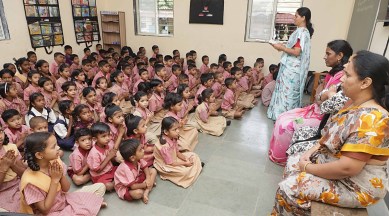Click here to join Express Pune WhatsApp channel and get a curated list of our stories
Maharashtra govt to expand Panshet cluster school experiment across the state
As per the circular, cluster schools will be planned at such a location that the travel time for the farthest student should not be more than 40 minutes and school buses are to be arranged through government or corporate funds.

Maharashtra’s education department has moved towards developing cluster schools, along the lines of Panshet Cluster School in Pune district that became operational earlier this year, throughout the state to deal with the problem of low student counts at schools in remote areas and hamlets.
Education Commissioner Suraj Mandhre has sent out a communique to officers of the department and zilla parishads asking them to identify schools that can be developed as cluster schools and submit proposals by October 15.
As per the circular issued by Mandhare, although schools have been opened in every village and almost every hamlet, including the most remote ones, as mandated by various schemes in the last 20-22 years, there has not been much success in imparting quality education in the remote schools.
“Barring the availability of schools in the village, the students studying at the remote schools have been deprived of the quality education. These schools don’t have any modern facilities, playgrounds, and very few co-learners. This is adversely affecting the multi-faceted growth of the kids,” reads the circular issued on September 21.
As per officials with the education department, the issue was discussed in a recent meeting chaired by Deputy Chief Minister Ajit Pawar and a decision has been taken to go ahead with the cluster school plan to rectify this anomaly, learning from the Panshet experiment.
Earlier this year, Pune zilla parishad opened a cluster school in Panshet in Velhe taluka to provide a better educational option to students studying in single-teacher schools in the periphery of 10 km. The two-school building has been redeveloped in the place of an existing school, with funds from industry donations. It has eight classrooms and six teachers. Two school buses fetch students from the villages located in the 10 km periphery of the school.
As per the recent circular, the cluster schools should be developed at such a location that the travel time for the farthest student should not be more than 40 minutes. The school buses to fetch the students are to be arranged through government or corporate social responsibility funds.
The government senses that the move may face opposition from teacher job aspirants fearing that the move will shrink teacher recruitment. The state government is in the middle of a teacher recruitment process through which, as claimed by Primary Education Minister Deepak Kesarkar, it plans to recruit 60,000 teachers in several rounds.
“The motive is not to close schools or reduce the teacher posts in the state. It is to provide the kids with sufficient educational facilities and an opportunity for multi-faceted development,” said an education department official.
As per the Education Commissionerate, there are 65,000 primary schools run by various local bodies—such as zilla parishad, nagar palika, nagar panchayat and municipal corporations—in the state. Of these, 1,734 schools have fewer than five students on their rolls, 3,137 schools have between six and 10 students and 9,912 schools have 10-20 students. Thus 14,783 schools in the state have fewer than 20 students.
“These schools generally are single-teacher or two-teacher schools. Here, most of the time the classes are merged and are taught together, affecting the quality of education. As per the New Education Policy, the schools must have basic infrastructure including working toilets, clean drinking water, clean and attractive spaces conducive to learning, electricity, computing devices, and internet, library and sports and recreational resources. These facilities can be provided at a cluster school,” read the circular sent to zilla parishad education officers.
The (primary) education officers with zilla parishads across the state have been asked to survey the schools with low enrolment and prepare proposals for developing cluster schools by October 15.
Click here to join Express Pune WhatsApp channel and get a curated list of our stories